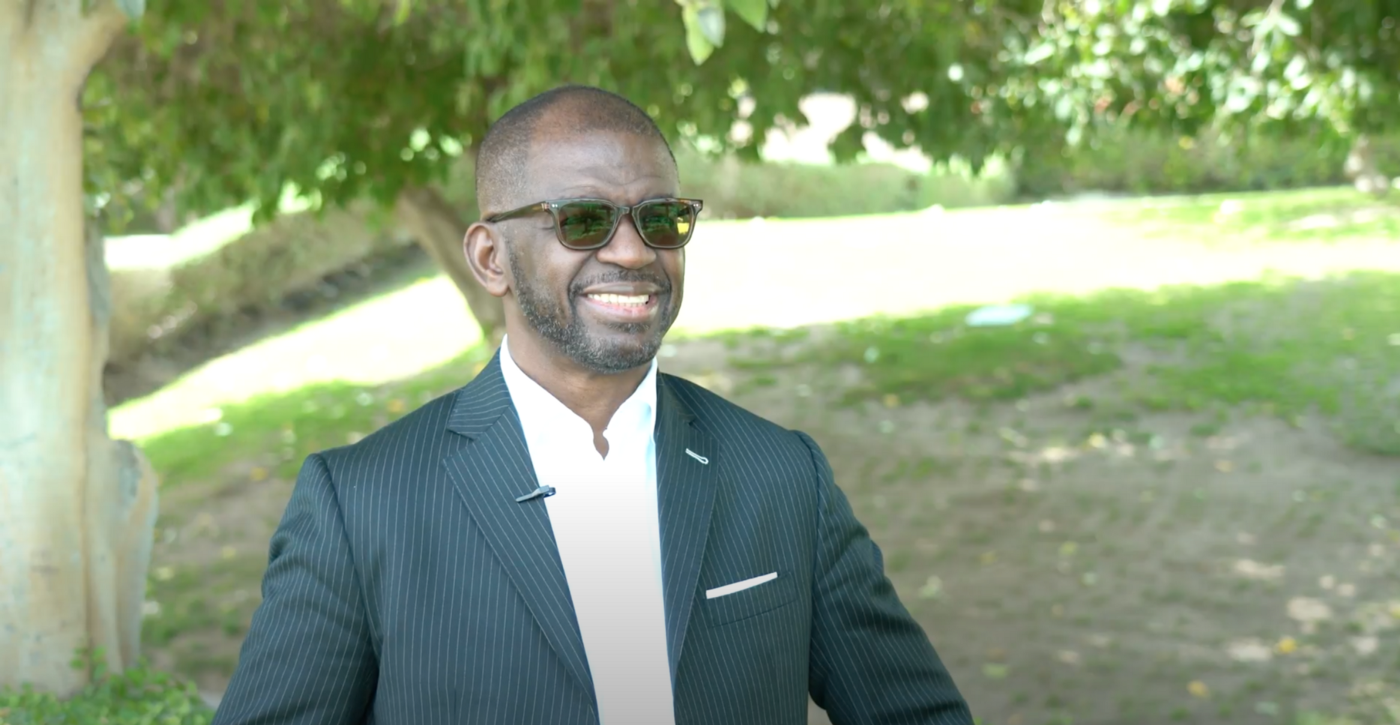The Future of Work Lies with the Next Generation Of Talent
Finance Maverick Papa Madiaw Ndiaye Discusses the Importance of Leveraging Tech-Savvy Talent for Success

Papa Madiaw Ndiaye is a founding partner and the current CEO at AFIG Funds, focused on the growth and profitability of companies in West and Central Africa. He is a graduate of Harvard College and holds an MBA from the Wharton School of Business.
We spoke with Papa at the 2022 Doha Forum, where he shared his journey in finance as well as the importance of creating opportunities for the next generation. As a self-described “talent identifier and relationship maker”, find out why he believes in surrounding himself with young tech savvy talent.
What inspired you to establish AFIG Funds?
I wanted to have an impact. I still do, but the nature of the impact has changed over time.
When we started in around 2005, fund managers investing in Africa were all based outside of the continent. They substantially invested in multinationals that were operating in Africa, which made sense because the companies were well structured and could really absorb the capital intelligently and efficiently. But I felt that we needed to start investing in African entrepreneurs and wanted to exclusively focus on that. This required a fundamental shift in the approach to investment because a lot of the African entrepreneurs didn’t have proper accounting; they were used to working alone and being the main person. They were also not used to being in a gender-diverse environment. They didn’t really believe in ESG and all of the things that are fundamental to the business landscape today.

If you invest in a can-do person who never leaves a stone unturned and is positive, you will most likely succeed.
We brought in our network and helped establish an ecosystem for entrepreneurs who were already succeeding and were just trying to get to the next level. I felt we needed to have a venture capital approach to private equity, growth and expansion. This meant that we had to take a technology — private equity that actually existed somewhere else — understand it well, operate it, and then adapt it to an African environment, ensuring that we had a lot of flexibility to keep moving forward.
How do you identify the right talent to invest in and hire?

Fundamentally I always say I’m interested in the ‘can-do’ attitude of a person. It’s all about the attitude, because you could be in the most pristine, beautiful investment environment, but if you invest in the wrong person with the wrong attitude, you will not sleep well at night. On the other hand, you could be in the worst environment, but if you invest in a can-do person who never leaves a stone unturned and is positive, you will most likely succeed because they will come up with opportunities and solutions in the face of potential disaster. So attitude is really important.
Over time, I’ve learned to see my job more as a talent identifier and a relationship maker. If the person I’m investing in doesn’t believe in me either, doesn’t want to share, doesn’t have a trusting relationship, then you’re throwing your money out the window because you don’t know what they’re going to do with it. But if they really want to team up with you and do something going forward, it’s earth-shattering; it’s a great feeling to know that you can make a difference. It’s a great time to be in Africa if you are a solutions provider, because there’s so much to solve for.
How important is it to you to create opportunities for the next generation of talent?

If you can’t leverage Africa’s young talent, you should not be working in Africa.
It’s fundamental. I mean, if you can’t leverage Africa’s young talent, you should not be working in Africa. In my case, I really believe that. One of the first things I did, as soon as I started AFIG Funds, was to work with my partners to start an internship programme. There were many things that I wanted to achieve, and being around talented and enthusiastic young people was going to solve for that. I wanted positive energy. When you work with people over a certain age, like myself, we have some energy, but it’s not the same. We’ve seen guys and girls full of hope, with the naivety that goes with it. I think that gets some of the creative juices flowing for somebody like myself.
Second is energy level. There’s so much to do in so little time. We’re not around in this world for a long time, as COVID has shown us. We have to be in a hurry and there’s no better people to do that with than talented young professionals. Lastly, I find young people in Africa are generally more appreciative of opportunity. This differs quite a lot from the entitlement mentality that managers around the rest of the world are increasingly having to deal with. Young professionals in Africa, you know, whether they come from wealthy or not so wealthy backgrounds, I find them on average to just be in the mood to work super hard and take things as they come. Working with them is so exciting.
How can young professionals best prepare themselves for the future of work?
The international language today is tech. So if you don’t speak tech, you have a problem.
Not too long ago — certainly coming from a French speaking country — the big thing was “learn English, so you can be fluent in the international language”. The international language today is tech. So if you don’t speak tech, you have a problem.
And again, let’s be very careful. I don’t want to intimidate and put anybody off when we talk about tech, because everybody thinks that they need to be a coder. You don’t necessarily need to be a coder, although it’s a valuable skill for the workplace. But you need to be able to understand tech. Otherwise, you can’t even do some of the most basic things that saved us during the pandemic; tech enabled us to continue to be productive.
For me, tech is just a new language. I say to young people: “Look at tech the way you look at speaking Chinese, the way you look at understanding what’s going on in the world. Without it, you’re kind of an ‘also-ran.’” You have to understand the things that are out there that you can leverage to make yourself more productive. So for me, tech is fundamental.

I think it’s fundamental to be a fighter. It’s fundamental to have grit. And all of that can be encapsulated by being anchored to your “why”.
Finally, what advice would you give to talented young professionals seeking to achieve success and add value to the companies and organisations where they work?
Three things. Number one: Don’t be fooled by acquiring a skill. It gets you through the door, but it doesn’t make you successful. Of course, you’ve got to get through the door first. You need to have the skill; go get trained, be excellent. Be number one, do whatever you can to really know technically what you need to do, because no one has time for technical glitches and mistakes. So don’t sleep on it, but don’t get too comfortable. Always be learning something new, and accept that what you just learned cannot be the be-all and end-all.
The second thing is your attitude. I think it’s fundamental to be a fighter. It’s fundamental to have grit. And all of that can be encapsulated by being anchored to your “why”. What makes you get up in the morning and go do what you gotta do? What makes you continue to work at 3:00 AM on that night when you need to get things done? It can’t be the money. It can’t be just success. It’s got to be something deeper. For those people of faith, maybe you lean into that. People who are not of faith, find what is really your inner core. Know your “why” — your mission — and stick to it. If there’s one thing that will make you successful, it’s that.

Always take the time to check in, surround yourself with people who make it impossible for you to forget who you are and what you’re trying to do.
In the last two years, I’ve taken it as a time to check in. Where am I? What do I need to do? And I feel like we’ve been given a warning. The human race has been taken to the edge of the cliff and it’s been a horrendous situation. But as you observe that, it’s important that you think to yourself, “I wasn’t off the cliff. So what do I do about that? And what do I do about the fact that I could have been off the cliff. What do I do with the rest of my time here?” Always take the time to check in, surround yourself with people who make it impossible for you to forget who you are and what you’re trying to do.
The third and last one — and I think the last few years really showed us this — is resilience. And knowing how to turn resilience into opportunity. Many companies have died in the last couple of years. But how many companies have risen to success? How many companies have actually taken advantage of the situation in order to pivot into a different direction? That’s true for companies. That’s true for people.
There are many lessons obviously, but to me, those are the fundamental ones. Ultimately, it’s all about being happy. If you can’t find a way to be happy, it’s really difficult to be successful.
The future of work has arrived. Find out more about how The ROOM is transforming companies across the globe with its pool of world-class talent.
